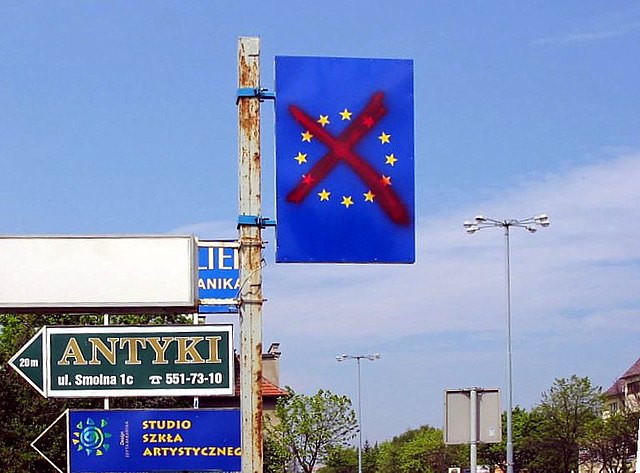Top Qs
Timeline
Chat
Perspective
Anti-Europeanism
Political term for opposition to Europe From Wikipedia, the free encyclopedia
Remove ads
Anti-Europeanism, Anti-European sentiment, and Europhobia are political terms used in a variety of contexts, implying sentiment or policies in opposition to Europe.

In the context of racial or ethno-nationalist politics, this may refer to the dislike, hatred, prejudice, mistreatment and/or discrimination against/toward the culture or peoples of Europe. In the shorthand of "Europe" (a British usage, standing for the European Union or European integration), it may refer to Euroscepticism, criticism of policies of European governments or the European Union.[1] In the context of United States foreign policy, it may refer to the geopolitical divide between "transatlantic", "transpacific" and "hemispheric" (Pan-American) relations.
Remove ads
Usage
Summarize
Perspective
United Kingdom
In the United Kingdom, "Europhobia" refers to negative attitudes towards mainland Europe, either in the context of anti-German sentiment or of anti-Catholicism,[2] or, more recently, of Euroscepticism in the United Kingdom.[3]
United States
American exceptionalism in the United States[4] has long led to criticism of European domestic policy (such as the size of the welfare state in European countries)[5] and foreign policy (such as European countries that did not support the 2003 US invasion of Iraq).[6]
Under the presidency of Donald Trump, critiques of NATO, particularly its funding, became a prominent issue. Although NATO includes non-European members such as the United States, Canada, and Turkey, the alliance is often perceived, especially by Trump and many Americans, as primarily a European defense treaty aimed at safeguarding European nations.[7]
Trump’s main criticism centered on the disproportionate financial burden shouldered by the United States, which effectively funds the majority of NATO’s military expenditures. He argued that many NATO member states fail to meet their commitment to allocate at least 2% of their GDP to defense spending, a benchmark agreed upon by all members.[8]
This critique gained renewed attention during the Russian invasion of Ukraine, which exposed the underfunding of military capabilities in several NATO countries.[9] Their inability to immediately provide substantial military aid to Ukraine highlighted longstanding concerns about reliance on U.S. defense resources. Many American critics view NATO as a vestige of the Cold War, where the U.S. continues to bear the cost of protecting Europe, particularly against threats from Russia, without equitable contributions from other member states.[10]
Remove ads
See also
Look up Europhobia in Wiktionary, the free dictionary.
- Anti-Americanism – Dislike of the United States and Americans
- Anti-Western sentiment – Hatred or opposition towards the Western world or its people
- European values – Norms and values that Europeans have in common
- Eurocentrism – Worldview centred on or biased towards Western civilization
- Eurotrash (term) – Derogatory term used in USA
- Pan-European identity – Personal identification with Europe
- Stereotypes of Americans – Generalized representations of US people
Remove ads
References
Further reading
Wikiwand - on
Seamless Wikipedia browsing. On steroids.
Remove ads
